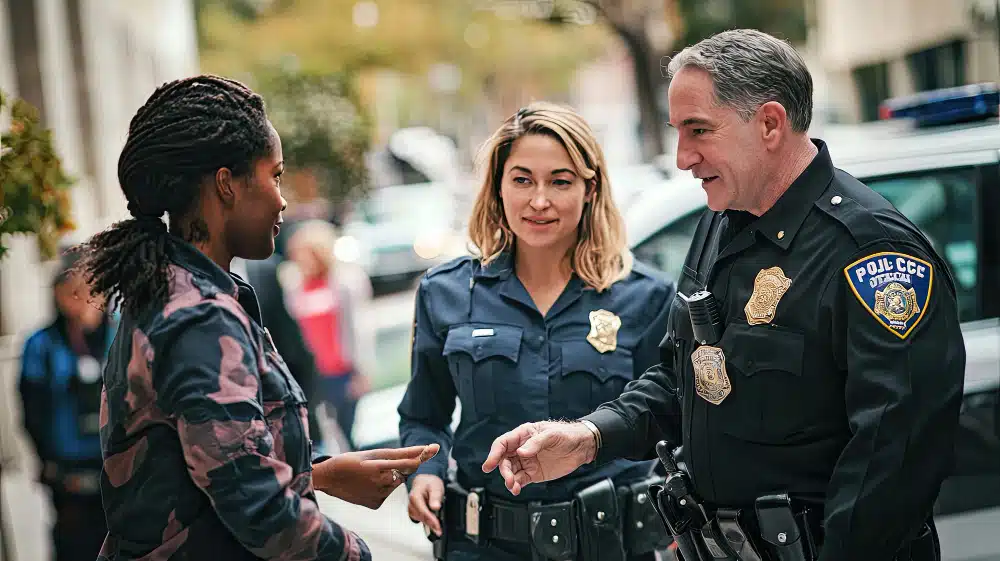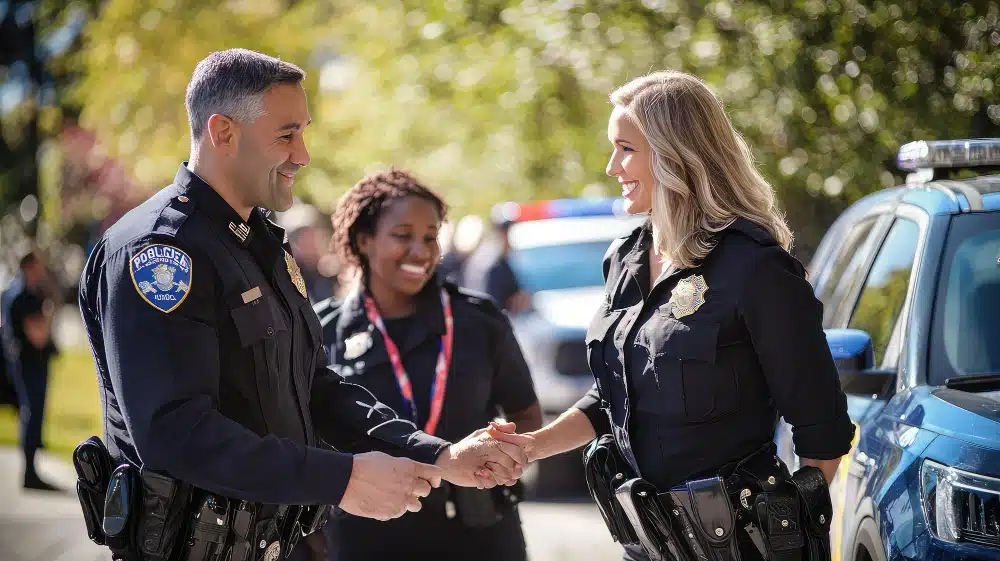Navigating encounters with law enforcement can be an anxiety-inducing experience for many people. Whether you’re pulled over for a traffic violation or approached by an officer on the street, it’s important to know how to handle yourself in a manner that promotes a smooth interaction. In this article, we will share five expert tips to help you navigate police interactions with confidence and composure.
Our goal is to provide you with practical advice, based on expert insights, to ensure that you are prepared for any encounter with law enforcement. From understanding your rights to effectively communicating with officers, we will cover essential strategies for a successful interaction.
It’s crucial to approach police interactions with a calm and respectful demeanor, regardless of the situation. We will discuss the importance of maintaining a cooperative attitude, while also asserting your rights within legal limits. By understanding how to handle various scenarios and being aware of potential pitfalls, you can navigate police encounters more confidently and reduce potential misunderstandings or complications.
Whether you’ve had negative experiences in the past or simply want to be better prepared for future encounters, this article will equip you with the knowledge and strategies to navigate police interactions with ease.
Understanding your rights during police interactions
Being aware of your legal rights is crucial when interacting with law enforcement. It’s important to know what you are and are not required to do during a police encounter. This knowledge can help you navigate the situation with confidence and ensure that your rights are protected.
One of the most fundamental rights you have is the right to remain silent. You are not obligated to answer any questions from the police, and you should exercise this right if you feel uncomfortable or unsure about how to respond. Simply state that you wish to remain silent and do not provide any further information without a lawyer present.
Additionally, you have the right to refuse consent for a search of your person, vehicle, or belongings. Unless the officer has probable cause or a valid search warrant, they cannot conduct a search without your permission. It’s important to clearly and firmly state that you do not consent to any searches.
Understanding the limits of police authority is also crucial. Officers cannot detain you or search your property without a valid reason, such as suspicion of criminal activity or a valid warrant. If an officer attempts to do so without proper justification, you have the right to politely assert your rights and refuse to comply.
By familiarizing yourself with your rights, you can ensure that you are prepared to handle police interactions in a way that protects your legal rights and maintains your dignity. Remember, knowledge is power, and understanding your rights can empower you to navigate these encounters with confidence.
Importance of staying calm and respectful
Maintaining a calm and respectful demeanor during a police interaction is crucial for ensuring a smooth and successful encounter. Even if you feel anxious or frustrated, it’s important to avoid escalating the situation through confrontational or aggressive behavior.
When interacting with law enforcement, it’s important to remember that officers are tasked with maintaining public safety and enforcing the law. While you may disagree with their actions or approach, responding with hostility or disrespect can often lead to further escalation and potential legal consequences.
Instead, aim to approach the interaction with a cooperative and respectful attitude. Speak clearly and calmly, make eye contact, and follow any lawful instructions given by the officer. This demonstrates your willingness to comply and can help de-escalate the situation, reducing the likelihood of misunderstandings or unnecessary confrontation.
It’s also important to avoid any sudden movements or actions that could be perceived as threatening by the officer. Keep your hands visible, and avoid reaching for anything without first informing the officer of your intention. This helps to build trust and reassure the officer that you are not a threat.
By maintaining a calm and respectful demeanor, you can help to establish a cooperative and productive dialogue with the officer. This can lead to a more positive outcome, where your rights are respected, and the interaction is resolved without incident. Remember, the way you present yourself can have a significant impact on the overall course of the encounter.

Communicating effectively with law enforcement
Effective communication is key when interacting with law enforcement. The way you convey information and respond to officers can greatly influence the outcome of the encounter. By adopting a clear and concise communication style, you can help to ensure that the interaction proceeds smoothly.
When speaking with an officer, it’s important to be direct and to-the-point. Avoid rambling or providing unnecessary details, as this can sometimes be interpreted as evasive or suspicious behavior. Instead, answer questions directly and provide only the information that is requested.
It’s also crucial to listen carefully to the officer’s instructions and requests. Pay attention to the specific language they use and follow their directives, as long as they are lawful. If you are unsure about something, it’s better to ask for clarification rather than assuming or guessing.
In addition, be mindful of your tone and body language. Speak in a calm and respectful manner, avoiding any aggressive or confrontational gestures. Maintain eye contact and avoid fidgeting or appearing nervous, as these behaviors can be misinterpreted by the officer.
If you need to assert your rights or disagree with the officer’s actions, do so in a polite and measured way. Avoid raising your voice or using confrontational language, as this can escalate the situation. Instead, clearly and firmly state your position, while still maintaining a cooperative demeanor.
Knowing when and how to assert your rights
While it’s important to be respectful and cooperative during a police interaction, there may be times when you need to assert your legal rights. Knowing when and how to do so can help ensure that your rights are protected and that the interaction remains calm and productive.
One of the most important rights to assert is the right to remain silent. If an officer begins to ask you questions, you can politely state, “I do not wish to answer any questions without a lawyer present.” This invokes your Fifth Amendment right against self-incrimination and can help prevent you from inadvertently providing information that could be used against you.
Another key right to assert is the right to refuse consent for a search. If an officer asks to search your person, vehicle, or belongings, you can clearly and firmly state, “I do not consent to any searches.” Unless the officer has probable cause or a valid warrant, they cannot conduct a search without your permission.
It’s also important to be aware of your right to ask for an officer’s identification and the reason for the interaction. You can politely request the officer’s name, badge number, and the specific reason for the encounter. This can help establish a clear record of the interaction and ensure that the officer is acting within the scope of their authority.
If an officer attempts to detain you or conduct a search without a valid reason, you can assert your rights by stating, “I do not consent to this detention/search, and I would like to leave.” However, it’s crucial to remain calm and avoid any physical resistance, as this could escalate the situation and potentially lead to further legal consequences.
Dealing with difficult situations during police interactions
While the goal is to have a smooth and cooperative interaction with law enforcement, there may be times when situations become more challenging or confrontational. In these cases, it’s important to remain calm and focused on protecting your rights.
One of the most difficult scenarios can arise when an officer becomes aggressive or abusive during the interaction. If you feel that an officer is using excessive force or engaging in unlawful behavior, it’s important to avoid escalating the situation further. Instead, focus on clearly and firmly asserting your rights, while maintaining a calm and respectful demeanor.
If an officer is verbally or physically abusive, it’s important to refrain from responding in kind. Resist the urge to argue or engage in confrontational behavior, as this can often make the situation worse. Instead, repeatedly state that you do not consent to the officer’s actions and that you wish to file a formal complaint or speak to a supervisor.
In some cases, an officer may attempt to provoke a reaction from you in order to justify further action or escalation. It’s crucial to remain composed and avoid falling into this trap. Remember, your goal is to protect your rights and ensure that the interaction is resolved peacefully, even in the face of difficult or antagonistic behavior from the officer.
If an encounter becomes genuinely threatening or you feel that your safety is at risk, it’s important to prioritize your personal safety and comply with the officer’s lawful instructions. You can address any concerns or complaints through official channels after the interaction has concluded.

Resources for learning more about your rights and police interactions
Navigating police interactions can be a complex and nuanced topic, and it’s important to have access to reliable resources to help you understand your rights and responsibilities. There are a variety of organizations and sources that provide valuable information and guidance on this important issue.
One of the most comprehensive resources is the American Civil Liberties Union (ACLU), which offers detailed information on your rights during police encounters, including your right to remain silent, your right to refuse consent for searches, and your right to record interactions with law enforcement. The ACLU website (www.aclu.org) provides a wealth of educational materials, including fact sheets, videos, and legal resources.
Another valuable resource is the National Police Accountability Project (NPAP), a program of the National Lawyers Guild. NPAP provides information and resources on police misconduct, excessive use of force, and strategies for holding law enforcement accountable. Their website (www.nlg-npap.org) offers a range of educational materials, including legal guides and case studies.
In addition to these national organizations, many state and local civil rights groups also offer resources and support for individuals navigating police interactions. These organizations can provide guidance on local laws and regulations, as well as assistance in filing complaints or seeking legal recourse if necessary.
It’s important to remember that while these resources can provide valuable information, they are not a substitute for legal advice. If you are facing a complex or serious legal situation, it’s always best to consult with a qualified attorney who can provide personalized guidance and representation.
Common mistakes to avoid during police encounters
While it’s important to know your rights and how to effectively communicate with law enforcement, there are also some common mistakes that people often make during police interactions that can potentially escalate the situation or lead to negative consequences.
One of the most common mistakes is resisting arrest or physically resisting an officer’s instructions. Even if you believe the officer’s actions are unjustified, it’s crucial to comply with their lawful directives and address any concerns or complaints through official channels later. Resisting arrest can result in additional charges and potentially escalate the situation.
Another mistake is providing more information than is necessary. While you have the right to remain silent, some people feel compelled to engage in lengthy explanations or provide unnecessary details. This can sometimes be interpreted as evasive or suspicious behavior, which can then lead the officer to probe further or take additional actions.
Failing to assert your rights in a timely manner is also a common mistake. If an officer asks to search your vehicle or belongings, it’s important to clearly and firmly state that you do not consent to the search. Waiting until after the search has been conducted to assert your rights may make it more difficult to challenge the legality of the search later on.
Additionally, some people make the mistake of becoming confrontational or argumentative with the officer. While it’s important to stand up for your rights, doing so in a hostile or aggressive manner can often backfire and lead to further escalation. Maintaining a calm and respectful demeanor is key to navigating these interactions successfully.
By being aware of these common pitfalls and taking steps to avoid them, you can help ensure that your interactions with law enforcement remain as smooth and productive as possible, while still protecting your rights and dignity.
Tips for recording and documenting police interactions
In today’s digital age, the ability to record and document police interactions has become an increasingly important tool for individuals seeking to protect their rights and hold law enforcement accountable. However, it’s crucial to understand the legal and practical considerations surrounding the use of recording devices during these encounters.
First and foremost, it’s important to be aware of the laws in your state or jurisdiction regarding the recording of police officers. In some areas, it may be legal to record an interaction without the officer’s knowledge or consent, while in others, it may be considered illegal. It’s essential to familiarize yourself with the relevant laws before attempting to record an interaction.
If you do decide to record an encounter, it’s important to do so in a discreet and non-confrontational manner. Avoid drawing unnecessary attention to the fact that you are recording, as this could potentially escalate the situation or prompt the officer to attempt to confiscate your device. Instead, try to position your camera or recording device in a way that is unobtrusive and doesn’t interfere with the interaction.
In addition to recording the interaction, it’s also important to document as much information as possible, such as the officer’s name, badge number, the date, time, and location of the encounter, and a detailed account of what occurred. This information can be invaluable if you need to file a complaint or pursue legal action in the future.
If an officer attempts to confiscate your recording device or prevent you from recording, it’s important to remain calm and assert your rights. Clearly state that you are within your legal rights to record the interaction and that you will not comply with any unlawful orders to stop or delete the footage.
Seeking legal advice and support if needed
While the tips and strategies outlined in this article can help you navigate police interactions more effectively, there may be times when you require additional legal support or guidance. Seeking the advice of a qualified attorney can be crucial in protecting your rights and ensuring that any legal issues are addressed properly.
If you feel that your rights have been violated during a police encounter, or if you are facing potential legal consequences as a result of an interaction, it’s important to consult with a lawyer as soon as possible. An experienced attorney can review the details of your case, provide guidance on your legal options, and represent you in any necessary legal proceedings.
In addition to seeking legal counsel, there are also various organizations and advocacy groups that can provide support and resources for individuals who have experienced issues with law enforcement. These organizations can offer guidance on filing complaints, accessing legal aid, and navigating the complex legal system.
It’s important to note that the specific legal requirements and procedures for seeking redress can vary significantly depending on your location and the circumstances of your case. Therefore, it’s crucial to work closely with a qualified legal professional who can provide personalized advice and assistance tailored to your unique situation.
By seeking the appropriate legal support and guidance, you can ensure that your rights are protected and that any issues or concerns are addressed through the proper channels. This can help to ensure that you are treated fairly and that any instances of misconduct or abuse are held accountable.

Conclusion: Empowering individuals to navigate police interactions confidently and responsibly
In conclusion, navigating police interactions can be a complex and challenging task, but with the right knowledge and strategies, individuals can approach these encounters with confidence and composure. By understanding your legal rights, communicating effectively with law enforcement, and knowing when and how to assert your rights, you can help ensure that your interactions with the police are smooth, productive, and respectful.
Remember, the goal is not to antagonize or escalate the situation, but rather to maintain a calm and cooperative demeanor while still protecting your rights and dignity. By approaching these interactions with a level head and a clear understanding of your responsibilities and entitlements, you can help to foster a more positive and constructive dialogue with law enforcement.
At the same time, it’s important to be aware of the potential challenges and pitfalls that can arise during police encounters, and to have a plan in place for addressing them. This may include seeking legal advice, documenting the interaction, and utilizing the resources and support available through civil rights organizations and advocacy groups.
Ultimately, the ability to navigate police interactions effectively is not just about protecting your own rights, but also about contributing to a broader societal shift towards greater accountability, transparency, and mutual understanding between citizens and law enforcement. By empowering individuals to engage with the police in a responsible and constructive manner, we can work towards a future where these interactions are characterized by mutual respect, cooperation, and a shared commitment to upholding the rule of law.
So, whether you’re facing a routine traffic stop or a more complex encounter with law enforcement, remember to stay calm, assert your rights, and seek the appropriate support and guidance when needed. By doing so, you can help to ensure that your interactions with the police are as smooth and successful as possible, while also contributing to a more just and equitable society for all.






